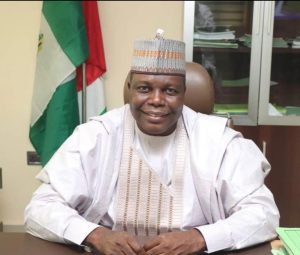Harnessing Biotechnology for Sustainable National Development

By Toyin Omozuwa
President Bola Tinubu’s reappointment of Prof. Abdullahi Mustapha as the Director General of the National Biotechnology Research and Development Agency (NBRDA) for a second tenure of five years has renewed the optimism of biotech experts. They see it as a clear sign that Nigeria will leverage renewable biological resources to drive sustainable development in agriculture, energy, healthcare, and the pharmaceutical industry.
Prof. Mustapha’s reappointment underscores the centrality of biotechnology to achieving the eight priority areas of President Tinubu’s administration, particularly food security. It also reflects the confidence that the President has in Prof. Mustapha’s leadership acumen.
During his first tenure, the National Biotechnology Development Agency (Establishment) Act, 2022 was passed. The passage of the Biotech Act underscores his capacity to foster policy dialogue, drive institutional reforms, accelerate development through legislative instruments, and work with divergent stakeholders for the greater good of Nigeria.
Empowering bioentrepreneurs to create wealth and jobs is one of the strategic goals of Prof. Mustapha’s second term agenda. This empowerment agenda requires public-private partnerships that ensure robust financial support, infrastructure development, and capacity-building programmes for a stronger innovative biotech ecosystem. These partnerships derive their importance from the fact that a thriving bioeconomy is not built by machines, but by ecosystems that work in harmony. The agency is bridging the gap between research centres and the market.
There is a growing awareness that bioeconomy is Nigeria’s future. The future does not come from what we extract, but from what we regenerate. Accelerating inclusive development requires harnessing Nigeria’s biodiversity wealth. Hence, the agency’s biotechnology hubs across the six geopolitical zones drive innovation in genetic engineering, crop improvement, and bio-based industries, and offer strategic support to biotech startups. NBRDA’s multi-functional collaborative mechanisms enable biotech startups to tap Nigeria’s rich biodiversity of over 4,000 plant species for sustainable economic development.
Under the leadership of Prof. Abdullahi Mustapha, the research and development efforts of the agency aim at enabling the development of more effective pharmaceuticals, vaccines, and diagnostic kits. Many Nigerians may not know that biotechnology contributes to sustainable drug manufacturing processes. The use of bio-based raw materials and renewable resources in pharmaceutical production is more environmentally friendly compared to traditional chemical-based methods. In other words, biotech-driven pharmaceutical production ensures that Nigeria meets its sustainability goals, boosts local manufacturing capabilities, and significantly reduces reliance on imports.
Nigeria faces significant environmental challenges due to poor waste management and pollution. Biotechnology offers solutions in bioremediation, which entails using microorganisms or plants to clean up oil spills, heavy metals, and other pollutants.
The agency’s recalibration of waste-to-value initiatives aims to encourage greater utilisation of agricultural waste for biogas production, promote sustainability, and resource efficiency. It also seeks to foster investments in sustainable bio-based industries such as eco-friendly packaging, ensuring Nigeria benefits from international green finance.
By implementing a framework that aligns with global sustainability goals, international partners are anticipated to provide greater funding for research and development into sustainable bio-based products, such as biodegradable plastics and biofuels. With appropriate investment, Nigeria will develop an eco-friendly bioeconomy, create new industries, and generate jobs.
To enhance Nigeria’s food security index and lower food price inflation, NBRDA is championing ethical and innovative biotechnology solutions that improve agricultural productivity and sustainability. Biotechnology enables the production of higher-yielding, pest-resistant, and drought-tolerant varieties of staple foods like maize, rice, and cassava through genetic modification (GM). In strict adherence to ethical stipulations, NBRDA develops bioengineered crops to reduce post-harvest losses, increase food supply, and ensure crop protection against pest attacks and adverse weather conditions. Additionally, bioengineered crops enhance nutrient content, fortifying crops with higher levels of vitamins and minerals, thereby addressing malnutrition.
Furthermore, the agency promotes biotechnological innovations like bio-fertilizers and bio-pesticides to ensure sustainable farming practices, reduce reliance on harmful chemicals, and improve soil health. Research and development activities at the agency seek to improve the quantity and quality of food production, helping Nigeria achieve food security, support smallholder farmers, and reduce dependency on food imports.
Given the growing climate of fear and the misinformation circulated by technophobia and Luddites, it is important to reassure Nigerians that biotech-based innovations occur within an ethical framework. NBRDA recognises that sustaining public trust in biotechnology requires adherence to ethical standards, transparent communication, and engagement with stakeholders. Hence, the agency consistently organises interactive fora with farmers, consumers, regulators, traditional, and religious leaders while promoting food security.
Prof. Abdullahi Mustapha, the entire management, and staff of NBRDA are devoted to using biotechnology to promote food security and reduce reliance on imports. NBRDA harnesses biotechnology for better healthcare service through the creation of affordable, locally produced medicines, vaccines, and diagnostic kits. Similarly, the agency reduces environmental impact by offering sustainable alternatives to petrochemical products. By driving innovation and creating green jobs, NBRDA supports Nigeria’s transition to a more sustainable, self-sufficient, and resilient economy.
Toyin Omozuwa is the Press Secretary to the Director General, NBRDA
For More Information About The Nigerian Post Newspaper, Call Editor in Chief on Telephone No. 08036065618.
Email:thenigerianpostnewspaper@gmail.com or abumich60@gmail.com




